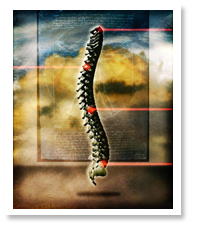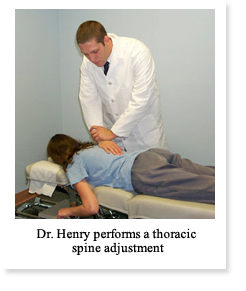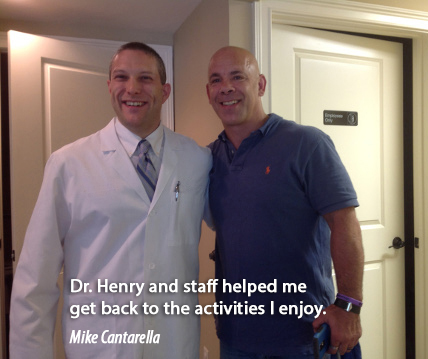
Doctors of Chiropractic (D.C.'s),
also known as chiropractors or chiropractic physicians, are experts in the care of bones, nerves, muscles and connective tissue, with particular emphasis on the spine and its relationship to overall health.
Chiropractic was founded in 1895,
based on the scientific principle that the body has an inborn striving to maintain good health, therefore chiropractors do not prescribe drugs or perform surgery, preferring natural methods that enable the body's innate healing capacity.
Chiropractors find and correct subtle biomechanical dysfunctions in the spine (what chiropractic professionals call the vertebral subluxation complex, or subluxation for short) that interfere with normal nerve function and interfere with the normal striving towards good health. This requires considerable skill, both in a sensitive touch to examine the involved joint(s) and speed and dexterity to accomplish a precise contact and line of correction. Chiropractors are the only professionals who provide this service.
 Chiropractors attend accredited colleges and universities, complete a 4 year graduate program on par with medical doctors and must pass rigorous state and national board examinations before becoming licensed to practice. Chiropractors perform examinations and order diagnostic tests, such as x-ray, MRI or CT scan when necessary to arrive at a diagnosis. Chiropractic treatment includes adjustments, sometimes called manipulation, to correct subluxation (spinal joint dysfunction), therapeutic modalities, such as heat/cold, electrical stimulation, traction, therapeutic ultrasound, and manual therapy/massage. Chiropractors are also qualified to make nutritional and exercise recommendations. When a patient requires other management, the chiropractic physician can provide referral to a specialist.
Chiropractors attend accredited colleges and universities, complete a 4 year graduate program on par with medical doctors and must pass rigorous state and national board examinations before becoming licensed to practice. Chiropractors perform examinations and order diagnostic tests, such as x-ray, MRI or CT scan when necessary to arrive at a diagnosis. Chiropractic treatment includes adjustments, sometimes called manipulation, to correct subluxation (spinal joint dysfunction), therapeutic modalities, such as heat/cold, electrical stimulation, traction, therapeutic ultrasound, and manual therapy/massage. Chiropractors are also qualified to make nutritional and exercise recommendations. When a patient requires other management, the chiropractic physician can provide referral to a specialist.
Chiropractors are experts in the treatment of whiplash and a chiropractor wrote the first textbook on the subject.
D.C.'s take care of the U.S. Olympic athletes and many professional athletes.
Chiropractic has recently been added to the Veteran's Administration hospitals and chiropractic services are available at many of the nation's more progressive hospitals. Some chiropractors also conduct research and teach at medical schools.
Chiropractic is supported by a growing body of scientific research and provides cost-effective treatment for neck and back pain, with a high degree of patient satisfaction.
Our Office

Dr. Luke Henry, D.C.
is trained in several chiropractic techniques and will select the best technique to correct the cause of your symptoms. For example, a patient who suffers from vertigo may have difficulty lying down, so it is sometimes better to treat such a patient in a sitting position. A patient with an acute lumbar disc herniation may be aggravated by a manual adjustment so a chiropractic instrument and soft tissue treatment may be indicated.
If you are apprehensive about visiting a chiropractor for the first time, we will take the extra time necessary to answer your questions and make you feel comfortable. Remember that there are many different chiropractic techniques. All chiropractic procedures are beneficial for some patients but you need to find a doctor who will provide the right technique to correct your problem.
Most patients
find our gentle treatment comfortable and relaxing. After starting to enjoy the benefits of chiropractic, many patients wonder why they waited so long!
Chiropractic adjustments (AKA spinal manipulation)

Dr. Henry uses a variety of gentle chiropractic procedures. This allows him to treat many difficult cases, including patients with acute (whiplash from car accidents, herniated discs, falls, work injuries) and painful chronic conditions. Dozens of physicians and other healthcare providers have referred patients to Dr. Henry and have trusted him to care for their own family's spinal conditions.
- Full Spine Diversified Chiropractic Technique
- Palmer / Sherman Upper Cervical Chiropractic
- Gonstead Chiropractic Technique
- Thompson (drop table) Chiropractic Technique
- Sacro-occipital Technique
- Activator Chiropractic
- Trigger Point Therapy / Soft Tissue Manipulation
- Extremity Chiropractic Adjustments
- Myofascial Disruption Technique
Dr. Henry performs a prone single hand contact chiropractic adjustment (Palmer / Gonstead technique).
Therapeutic Modalities
Dr. Henry has completed a course in therapeutic modalities through New York Chiropractic College, passed the National Board of Chiropractic Examiners Physiotherapy examination, and is qualified by the South Carolina Board of Chiropractic Examiners. Therapeutic modalities help to reduce pain, spasms, and inflammation, increase circulation and promote soft tissue healing.
- Superficial heat (hydrocollator / moist hot packs)
- Cryotherapy (cold packs, ice massage)
- Ultrasound (deep heat therapy)
- Electrical stimulation (TENS, interferential)
- Mechanical traction (cervical, thoracic, lumbar, intersegmental, cervical extension, and long axis)
- Low-Level Laser Therapy (AKA Cold Laser)
- Nonsurgical Spinal Decompression
Therapeutic Procedures
Our office makes use of passive and active modalities. Patients are encouraged to do therapeutic exercise.
- Deep Tissue Massage
- Myofascial Release
- Exercises to improve flexibility, strength, range of motion and endurance
- Elastic band and stability ball exercises
- Proprioceptive Neuromuscular Facilitation
Durable Medical Equipment and Home Therapeutic Products
- Custom orthotics
- Home TENS (Transcutaneous Electrical Nerve Stimulation) units
- Back braces
- Kinesiology taping
- Custom cervical pillows
- Reusable hot / cold packs
- Biofreeze for topical pain relief
Following is a basic list of just some of the conditions that have been corrected through proper Chiropractic caree
PAIN :
- Chronic Pain
- Arm Pain
- Shoulder Pain
- Hip Pain
- Elbow Pain
- Leg Pain
- Back Pain
- Neck Pain
- Foot Pain
- Knee Pain
- Wrist Pain
- Bursitis
- Carpal Tunnel Syndrome
- Headaches
- Migraines
- Muscle Spasms
- Numbness
- Sciatica
- Scoliosis
- Slipped Disc
- TMJ
- Whiplash
- Golf Related Pain
- Arthritis Pain
GENERAL :
- Dizziness
- Fatigue in muscles or tendons
- Muscular aching, burning, throbbing, shooting, stiffness or stabbing
- Muscle twitching
- Numbness and tingling sensations
- Tingling, burning or aching feelings in the calves, thighs, or feet
- Restless legs/feet
- Lack of energy
- Morning stiffness
- Wake up not feeling refreshed
- Difficulty concentrating
- Difficulty thinking
- Recurrent migraine or tension-type headaches
- Diarrhea and/or constipation
- Abdominal pain
- Swelling in fingers or toes, or any type of joint swelling.

 Chiropractors attend accredited colleges and universities, complete a 4 year graduate program on par with medical doctors and must pass rigorous state and national board examinations before becoming licensed to practice. Chiropractors perform examinations and order diagnostic tests, such as x-ray, MRI or CT scan when necessary to arrive at a diagnosis. Chiropractic treatment includes adjustments, sometimes called manipulation, to correct subluxation (spinal joint dysfunction), therapeutic modalities, such as heat/cold, electrical stimulation, traction, therapeutic ultrasound, and manual therapy/massage. Chiropractors are also qualified to make nutritional and exercise recommendations. When a patient requires other management, the chiropractic physician can provide referral to a specialist.
Chiropractors attend accredited colleges and universities, complete a 4 year graduate program on par with medical doctors and must pass rigorous state and national board examinations before becoming licensed to practice. Chiropractors perform examinations and order diagnostic tests, such as x-ray, MRI or CT scan when necessary to arrive at a diagnosis. Chiropractic treatment includes adjustments, sometimes called manipulation, to correct subluxation (spinal joint dysfunction), therapeutic modalities, such as heat/cold, electrical stimulation, traction, therapeutic ultrasound, and manual therapy/massage. Chiropractors are also qualified to make nutritional and exercise recommendations. When a patient requires other management, the chiropractic physician can provide referral to a specialist.
 Dr. Henry uses a variety of gentle chiropractic procedures. This allows him to treat many difficult cases, including patients with acute (whiplash from car accidents, herniated discs, falls, work injuries) and painful chronic conditions. Dozens of physicians and other healthcare providers have referred patients to Dr. Henry and have trusted him to care for their own family's spinal conditions.
Dr. Henry uses a variety of gentle chiropractic procedures. This allows him to treat many difficult cases, including patients with acute (whiplash from car accidents, herniated discs, falls, work injuries) and painful chronic conditions. Dozens of physicians and other healthcare providers have referred patients to Dr. Henry and have trusted him to care for their own family's spinal conditions.
